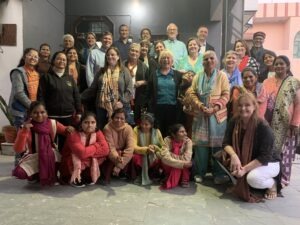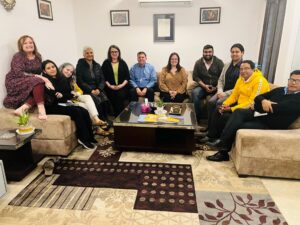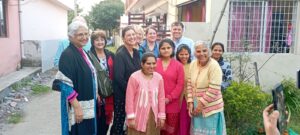Keystone Human Services was pleased to host members from the ANCOR Global Council for a study visit to India in February. Two staff members from ANCOR and eight leaders from American human service organizations that are members of ANCOR spent ten days alongside leadership from Keystone Human Services and staff from Keystone Institute India, visiting support services and residential services available to people with disability in North India.
Chuck Sweeder, President and CEO of Keystone Human Services, reflects on the study visit.
 I had the pleasure of both hosting and attending the recent study visit to North India with members of ANCOR. As we traveled through Delhi, Uttarakhand, and Uttar Pradesh, visiting support and residential services, I was struck by how much we can learn from the way services are provided in other countries, with different funding mechanisms, different levels of community and family involvement, and different advocacy and models of care for people with disability.
I had the pleasure of both hosting and attending the recent study visit to North India with members of ANCOR. As we traveled through Delhi, Uttarakhand, and Uttar Pradesh, visiting support and residential services, I was struck by how much we can learn from the way services are provided in other countries, with different funding mechanisms, different levels of community and family involvement, and different advocacy and models of care for people with disability.
Unlike the United States where services for people with disability are highly regulated and funded by state and federal governments, India has very little regulation for these types of services. Human service organizations rely on self-pay systems, fundraising, or very loose government support. Another funding mechanism is the Corporate Social Responsibility (CSR) requirement where corporations of a certain size must donate 2% of net profit to nongovernmental/nonprofit organizations.
 Although this lack of regulation can result in poor living conditions for people with disability, it also creates the environment for services focused on true inclusion to flourish. We had the opportunity to meet several people with disability who were very clearly valued members of their community. Family and community were the hallmark of natural supports people received to live, work, and take on valued roles. In a culture where multi-generational families live together and neighborhood bonds are strong, these organic nonpaid supports are an essential element.
Although this lack of regulation can result in poor living conditions for people with disability, it also creates the environment for services focused on true inclusion to flourish. We had the opportunity to meet several people with disability who were very clearly valued members of their community. Family and community were the hallmark of natural supports people received to live, work, and take on valued roles. In a culture where multi-generational families live together and neighborhood bonds are strong, these organic nonpaid supports are an essential element.
Many of the services that we visited were established by family members looking for better lives for their loved ones. I’m thinking of our visit to Project Arunima, a residential program based on a self-pay model developed by Aparna Das for her sister Arunima, who has autism, and for people like her. The program takes an individualized approach focused on continuous growth to support people to live fulfilling lives as independently as possible.
 We also met Anil and Rashmi Joshi, whose daughter Davanshi is a strong advocate for inclusion and has taken her place in the competitive workforce.
We also met Anil and Rashmi Joshi, whose daughter Davanshi is a strong advocate for inclusion and has taken her place in the competitive workforce.
Another flourishing program was the Keystone-supported Community Lives, where women have received support to leave institutional settings to live more full lives in the community. This particular program was established through a partnership between Keystone Institute India as the technical lead, Herbertpur Christian Hospital as the implementing partner, and the government and the Rural India Supporting Trust (RIST) as the funding partners. The women choosing to receive services live in homes within the community with three others, and they are included in everything the community has to offer. They participate in festivals and have joined a neighborhood yoga group. They’re actively included in birthday parties, weddings and other get-togethers. Significantly, they have become valued members of a community that truly cares for each other. Powerfully, we connected with the Keystone team responsible for the family reunification program in Uttarakhand, where they are working directly within the institution, mapping the pathways out for these women, reunifying them with their families who they were often merely lost to.
Keystone Human Services has been operating in India since 2015 when we established the flagship program, Keystone Institute India, providing consultation and values-based education to develop the foundations of inclusive supports so people with disability can live their best lives within the community. Although we are based in the United States, our global operations rely on local leadership, and we look to the culturally valued analogue not just for providing appropriate services but for daily life.
We are, at heart, a learning organization, and study visits like this hold great value for both participants and the host organization. I think we all flew back to the United States full of thoughts about the opportunities for inclusion and supporting people with disability to lead valued lives of their own choosing. Thank you to everyone at Keystone Human Services International and Keystone Institute India for organizing such an impactful, thought-provoking study visit.


 I had the pleasure of both hosting and attending the recent study visit to North India with members of ANCOR. As we traveled through Delhi, Uttarakhand, and Uttar Pradesh, visiting support and residential services, I was struck by how much we can learn from the way services are provided in other countries, with different funding mechanisms, different levels of community and family involvement, and different advocacy and models of care for people with disability.
I had the pleasure of both hosting and attending the recent study visit to North India with members of ANCOR. As we traveled through Delhi, Uttarakhand, and Uttar Pradesh, visiting support and residential services, I was struck by how much we can learn from the way services are provided in other countries, with different funding mechanisms, different levels of community and family involvement, and different advocacy and models of care for people with disability. Although this lack of regulation can result in poor living conditions for people with disability, it also creates the environment for services focused on true inclusion to flourish. We had the opportunity to meet several people with disability who were very clearly valued members of their community. Family and community were the hallmark of natural supports people received to live, work, and take on valued roles. In a culture where multi-generational families live together and neighborhood bonds are strong, these organic nonpaid supports are an essential element.
Although this lack of regulation can result in poor living conditions for people with disability, it also creates the environment for services focused on true inclusion to flourish. We had the opportunity to meet several people with disability who were very clearly valued members of their community. Family and community were the hallmark of natural supports people received to live, work, and take on valued roles. In a culture where multi-generational families live together and neighborhood bonds are strong, these organic nonpaid supports are an essential element. We also met Anil and Rashmi Joshi, whose daughter Davanshi is a strong advocate for inclusion and has taken her place in the competitive workforce.
We also met Anil and Rashmi Joshi, whose daughter Davanshi is a strong advocate for inclusion and has taken her place in the competitive workforce.